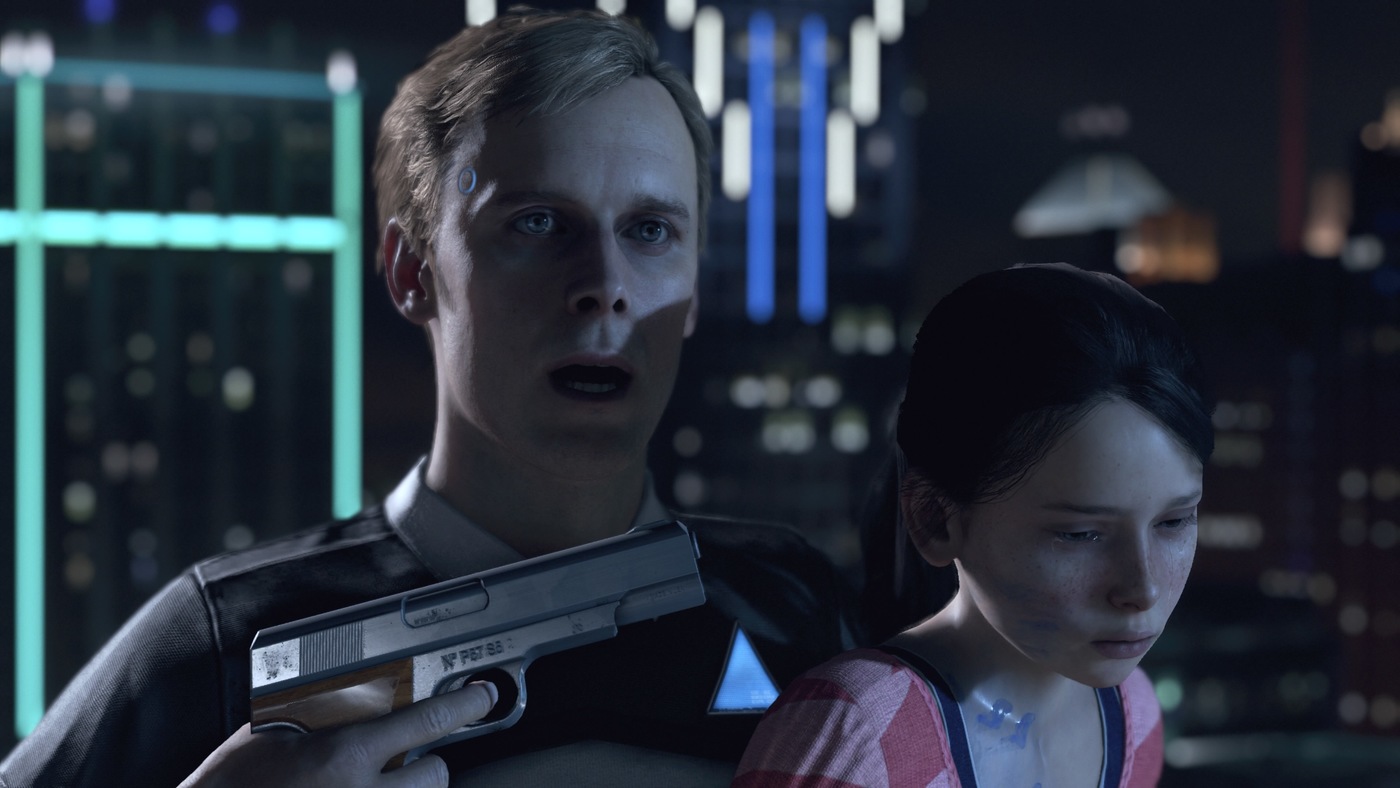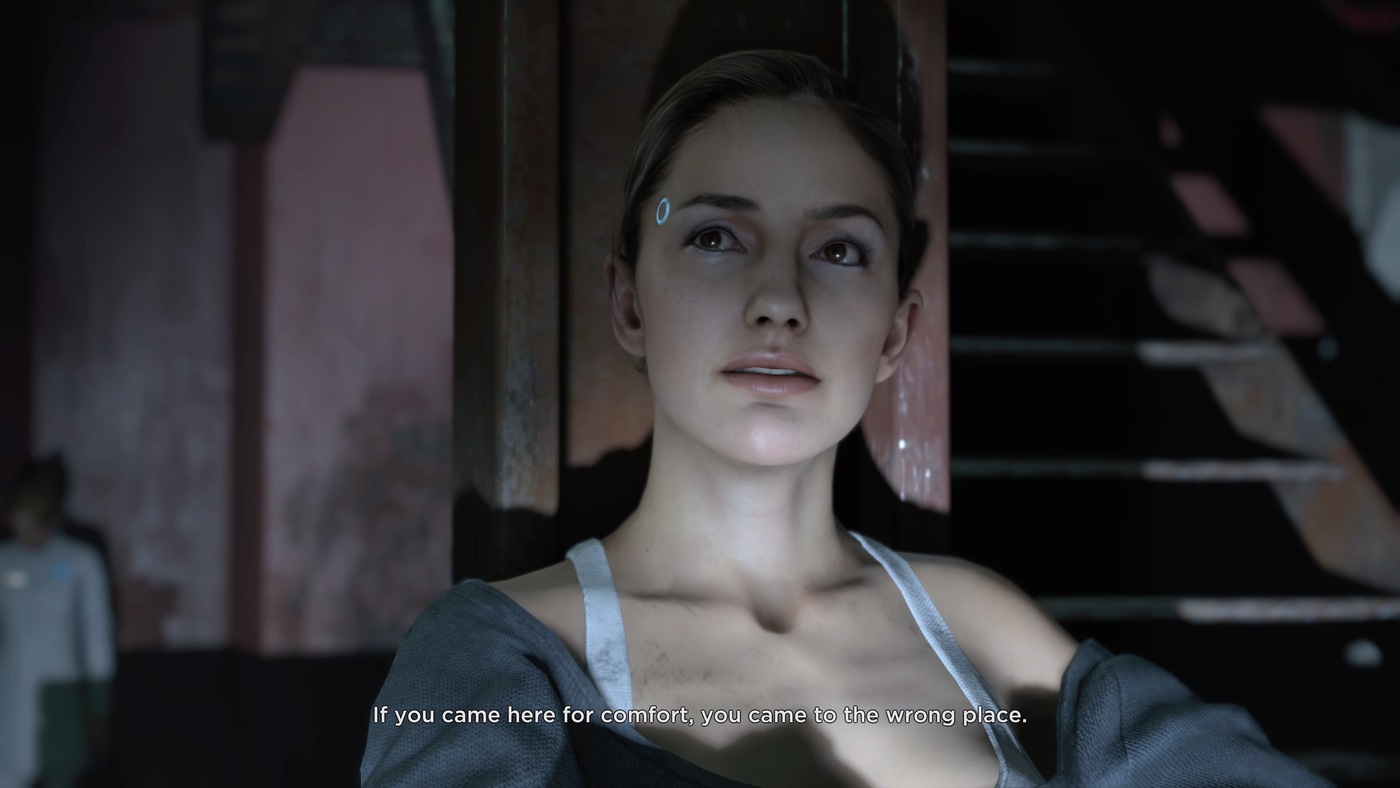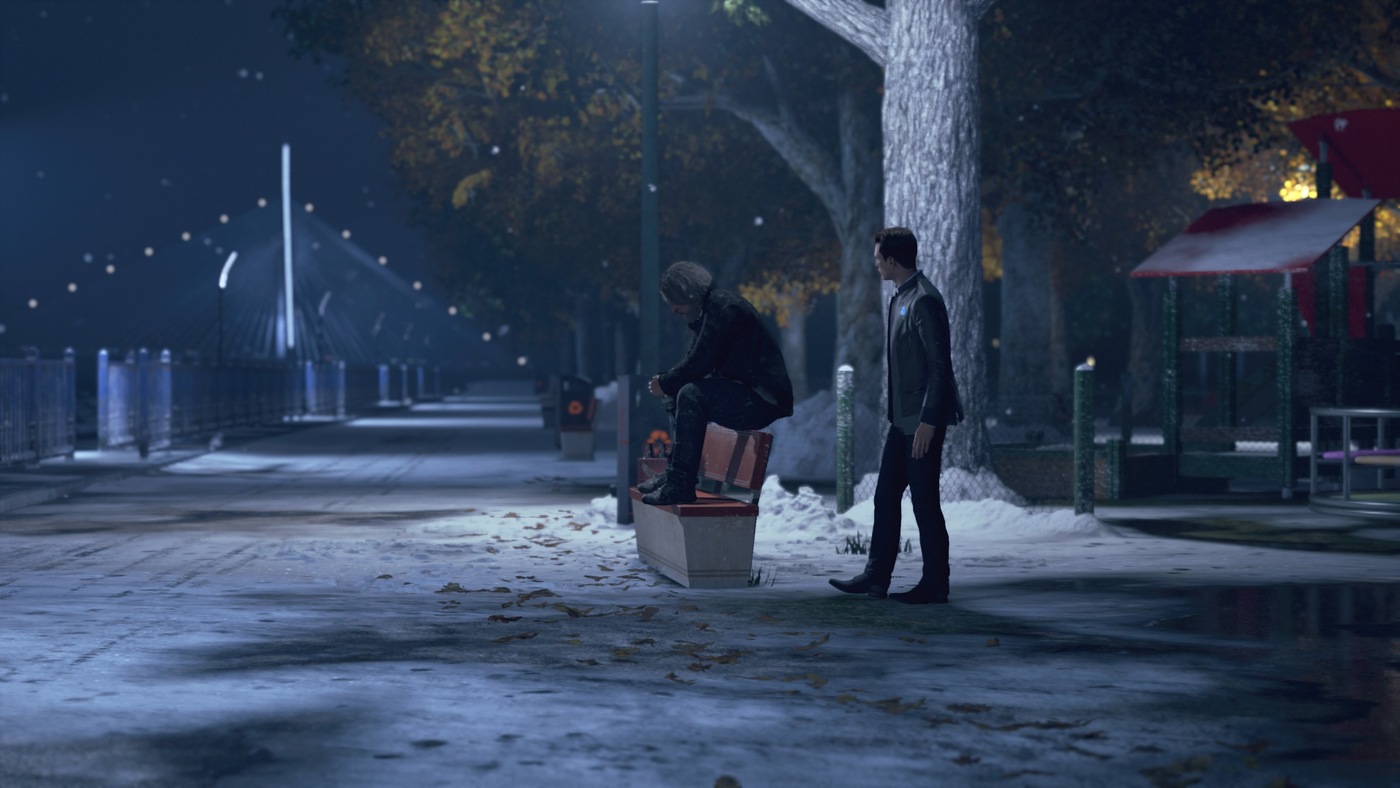More Human than Human.
It was out of sheer curiosity that I purchased Detroit: Become Human as I wasn't really a fan of Heavy Rain, and I still haven't had the chance to crack open my copy of Beyond: Two Souls. I've been loosely following the game during its development, but mostly as a passerby, never once putting much stock into being excited about playing it. After completing my first playthrough, I can safely say that Detroit: Become Human is one of the best games I've played this year and a strong contender for my game of the year.
Detroit: Become Human is one of those games that many will argue whether if it is a 'game' or just a series of interactive cutscenes. While you do have the ability to walk around and explore the environment, interacting with various items and people, there is certainly some truth to both arguments about what this 'game' truly is. The real meat of a game like Detroit is in the narrative choices you make and the consequences that come from those choices. If you are familiar with Quantic Dream's previous two games; Heavy Rain and Beyond: Two Souls, then you should have a pretty good idea of what to expect here. If you have not, then just imagine this as a far better looking and playing version of a Telltale adventure game.
As is the case with most choice-based narrative games, the story will change slightly based off those choices but work within the confines of an established plot. While the core themes of slavery and equal rights are played out through the roughly 10-12 hour story, you will jump between three vastly different characters who are interlocked into one single overall story. Each character is introduced in a way that gives you a decent amount of context behind their everyday lives. You have the caregiver, Markus, who tends to the needs of an elderly painter, Connor, a prototype police model sent to work with the Detroit PD and finally, we have Kara, a resident robomaid who tends to her abusive owner's every whim and is also charged with looking after his daughter, Alice.
It is really hard not to mention how much the story told here attempts to ape our own societies history of racism. Detroit borrows so much from the Civil Rights movements of the mid 50's to the late 60's, that it is sometimes too on the nose about how it attempts to integrate itself into the narrative. Another borrowed piece of history is through the underground railroad that allowed many slaves to escape to Canada. Where is that underground railroad located? Well, under Detroit, of course. Nearly every aspect of what our trio of characters will go through is built around the racial bigotry that existed back then, and frankly, still exists in many ways to this very day.
Racism and equal rights are at the forefront of this story and are not only played out via the dialogue and story moments but in the background of this futuristic Detroit. Among the protestors claiming that an Android stole their job, the streets are filled with stations to park your android, escalators that are reserved for humans only, to public transit buses having a segmented off compartment for your robotic help. Despite the lack of originality due to the integration of this borrowed history, the story, its characters, and the world that has been crafted here all come together to tell a very compelling and engaging story about acceptance and discovery.
One of the most appealing aspects of Detroit is in how different each character's campaign not only plays but in how it feels as well. Depending on your choices, you will intersect your current character with the others at various points in the story, which is often used to great effect. While the mixing of these characters works to better the story, each character has a very different tone and gameplay sense from one another. With Connor, you play the role as a Detective, or rather, the assistant to one. This leads you to various crime scenes, interrogations, and high-action chases. As I am working through the game a second time, making radically different choices than my first go around, it is interesting to see how the different paths actually alter the personality of each character, especially Connor. While Kara and Markus have engaging storylines and character interactions, they get less to do gameplay wise, at least in regards to their variety.
Given that Detroit's story lives and dies by your choices, your mileage may vary when it comes to what you get out of it. I've had numerous conversations with a few co-workers about their choices and how they handled certain scenes. What I found so refreshing is how many of them didn't even experience anything similar to what I had gone through, and vice versa. There are still moments I've seen in trailers and gameplay videos that I'm still unsure how to come across and even knowing that each character can actually die and affect the story is something that adds real weight to your choices. In fact, I sat there in disbelief when Connor was shot in the face during an interrogation gone wrong. I then wondered if I should go back and tackle the scene a different way, or just let it play out and see what happened next. It is these moments that felt really satisfying, even if I wasn't on board with losing a character.
While the core spine of the story cannot be changed, the moments built around it can and quite drastically even. As you get to know each of the characters and the supporting cast that comes along with them, you can unlock additional dialogue moments that can lead to certain scenario's that only come from making certain choices beforehand. You may question if it's truly important to strike up a conversation about if someone has a dog or what sports team they like, but these conversations can eventually lead to far more important events. While there are some moments in the game where it will make certain decisions for you, they are rare and are only there to keep the story moving in the direction of the firm narrative.
For almost its entirety, I adored the storylines of each the characters and the main thread that entwined them all together. While the path I took was one of many, It ended in a way that I felt was perfect for the journey I took my characters on. The only aspect of the story that didn't really sit right with me was the abilities that Markus gains during a non-violent march in the streets. It was the only moment in the game where I was pulled out of the immersive world that Quantic Dream had constructed and felt like I was watching a made for Netflix Sci-fi movie. Had the game provided some context to how this was occurring then I may have bought into it a bit more.
As you complete each chapter, you will be shown the path you took based on all available options that were present. Most paths are unlocked through conversation, discovering something in the environment, or failing certain button prompts or the light puzzle solving the game offers. While your choices are vast and plenty, there are times where the destination will be the same regardless of your choices, but the journey itself will be drastically different, or at the very least changed up in some small way. There are several choices that I struggled with, unsure if I had made the right call. The hardest choice I had to make in the game was actually after the credits had rolled, a decision that I was surprised how much it impacted me, emotionally.
The core gameplay hasn't changed much with regards to what Quantic Dream has done before. You'll have timed button prompts during action sequences, flips and pushes of the analog stick to open a cabinet or close a door, and you'll need to make quick decisions on the fly that can end with the death of a character should you fail a series of button prompts. While there are simple prompts of pressing the L2 button and then following it up with slamming down the X button, there are a few that get a bit out of control with pressing R1, then R2, then L1 and finally the Circle button. There are different settings to make the controls a bit more streamlined or going full in with motion controls, should that be something you want from this experience.
While you can explore the environments, there is a bit of an annoyance via the invisible walls that pollute many locations. You'll see an area that can easily be walked to and your character will stop in their tracks, unable to progress further. My biggest issue with the invisible walls are through the objects littered around most locations or just in some of the level design itself. While there are usually large areas to move around in, catching certain areas at the wrong angle can cause your character to stop and thus requiring you to back up and give that turn a wider berth. It's a small annoyance, but one that happened frequently.
There is no denying just how good this game looks. Several of the characters are digital recreations of the actual actors; many of them are notable actors from shows like Grey's Anatomy, or a 'seen them in everything' type with the likes of Clancy Brown. Valorie Curry, who you may recognize from Veronica Mars, or The Following, is excellent here as Kara. The small subtle ways she smiles or the look in her eyes when she's protecting Alice is truly well done and while a lot of that has to do with how great the characters models are, much of it is in part to her wonderful performance. Bryan Dechart, who is probably the least known of the bunch, sores as the Cyberlife android, Connor. I honestly don't know if anyone could have delivered a better version of the character as not only does he nail the look, but the way he speaks and approaches everything presented to him is flawless. His interactions with Clancy Brown's Anderson character is some of the best stuff in the game and frankly, I'd watch a TV show built around the two. Lastly, Markus, as performed by Grey's Anatomy actor Jesse Williams. I found that Markus had a tiny bit more detail put into his model than the others, as some scenes are packed with so much detail to him and his supporting cast that it was almost distracting how good it looked.
The supporting cast available during my playthrough was somewhat hit and miss. Alice, the young one that Kara rescues from an abusive home lacks any charisma and just didn't make me interested in her story. I liked the scenario of Kara and Alice on the run, but Alice herself just wasn't an interesting character, until far too late into their story. Clancy Brown's Hank Anderson is a scene stealer and while I'm usually iffy on his presence in most projects, the character seems tailor-made for how cheesy the actor can usually come across. Minka Kelly, who plays North, isn't a stranger to Android-based Sci-Fi, as she starred in the short-lived Karl Urban Android TV drama, Almost Human. I loved her as North, but felt that some of her scenes with Markus felt forced or implied that things happened to bring them closer together than what was shown to us. Evan Parke as Luthor is another great character that I'm hoping to see more of during my second playthrough. There are countless other smaller roles that really stand out here, but more or less, there really isn't a bad performance anywhere in this game.
One aspect of performances and character likability comes from your choices as some key points in the game can alter the personality of some characters. In my first playthrough, I kept Connor conflicted on following his mission to the letter and then occasionally breaking protocol to keep him in a state of confusion until I went full rebel and gave him a clear direction in the story. My second go-around is full business, 100% to the mission and it has certainly changed the way I approach and embrace this version of the character. Even my interactions with Hank are very different and It is very interesting to even talk with other people about how they played Connor and where their stories ended up.
While I am usually not one to put stock into unlocking art collectibles or behind the scenes content in games, I was really invested in what Detroit had to offer. There are short films, behind the scenes featurettes, and the character models of every character can be unlocked and inspected at your leisure. As you make choices and play the game, you will earn points that can be used to buy this content. Character models are a cheap 150 points, but the more in-depth content is around 300. During one playthrough, I unlocked over 80 characters, dozens of artwork, and every single video item that I could find. While not part of the unlockable content, the android that hosts the main menu was one of my favorite parts of this game and a superb design choice in every capacity. I would often let the game run to hear more of her dialogue, and should you pop back to the menu between each chapter or after a character dies, you are treated to some dialogue moments that are very easy to miss.
Detroit: Become Human is a very divisive game. Review scores are all over the place and it is easy to see why. Many people will come into this game and either see freedom or a strict structure of how the game plays. If you embrace the choices that are given to you and enjoy a character-based narrative, then Detroit will certainly entertain you. If you approach this as a typical game and expect very "video game" type systems, controls, and different types of gameplay variety, then you can expect to enjoy it probably a bit less. I am far more interested in the narrative components of the game than the gameplay portions, at least to a certain point, and therefore I found Detroit to be an engrossing and vastly enjoyable adventure that I couldn't stop playing. I had zero expectations going into this game and was more than pleasantly surprised at not just how good the game was, but how taken I was with it. It has a few gameplay issues and the environmental detection can certainly pull you out of the experience here and there, but overall, Detroit is a phenomenal journey that truly needs to be experienced.
















